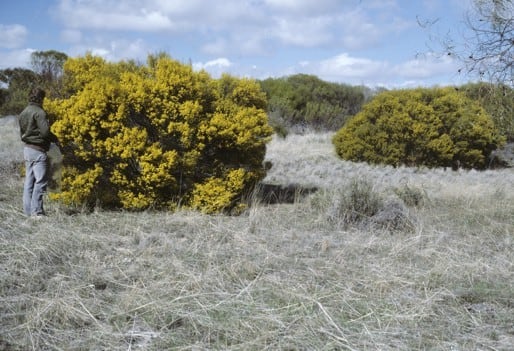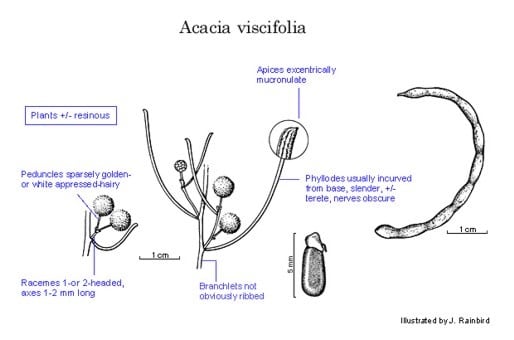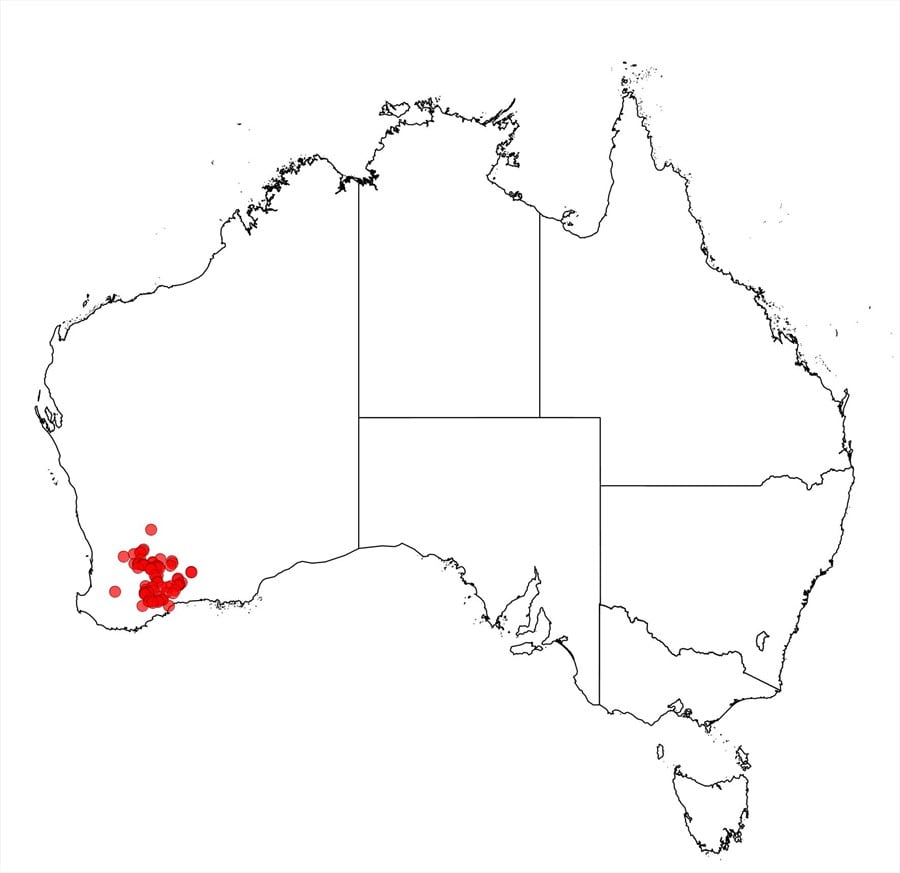Acacia viscifolia Maiden & Blakely
WATTLE
Acacias of Australia
Family
Fabaceae
Distribution
Occurs from near Quairading E to Frank Hann Natl Park and S to Ongerup, south-western W.A.
Description
Shrub 0.3–1 m high, rather dense, often slightly resinous. Branchlets sparsely to moderately puberulous with hairs normally appressed and often golden at extremities. Phyllodes patent to erect, filiform, incurved or if straight then often markedly curved upwards at base, ±terete, usually 1–3 cm long, 0.5 mm wide, excentrically mucronulate to rostriform, with mucro commonly blunt and indistinct, sometimes subuncinate, green, glabrous or subglabrous, indistinctly 5- or 7-nerved; gland obscure, 1–2 mm above pulvinus. Inflorescences 1- or 2‑headed racemes with axes 1–2 mm long, sometimes simple; peduncles 3–6 (–7) mm long, ±sparsely appressed-puberulous with golden and/or white hairs; basal bract solitary; heads globular, 13–23-flowered, golden. Flowers 5-merous; sepals 1/4–3/4-united. Pods (few seen) linear, curved or twisted, to 6 cm long, 2–3 mm wide, thinly coriaceous, glabrous, viscid. Seeds longitudinal, oblong, 4 mm long; aril terminal.
Habitat
In sand, loam or clay, commonly in low-lying areas near watercourses, in Eucalyptus woodland or shrub or tree mallee associations.
Specimens
W.A.: E side of Fitzgerald R., Ongerup–Ravensthorpe Rd, 4 Sept. 1976, A.S.George s.n. (PERTH); 0.8 km N of Pederah, K.Newbey 3227 (CANB, L, PERTH); 16 km E of Mt Madden, P.G.Wilson 6871 (CANB, K, PERTH, MEL).
Notes
Perhaps should be treated as an infraspecific taxon of A. wilhelmiana which is distinguished by its ribbed branchlets and densely golden appressed-puberulous peduncles. Three collections from the Ongerup–Newdegate area are unusual (K.R.Newbey 911 and s.n., M.H.Simmons 1340, all PERTH). They superficially resemble A. viscifolia but their branchlets are ribbed like A. wilhelmiana; their peduncles are densely appressed-puberulous but the hairs are white. Typical A. viscifolia occurs in the Ongerup–Newdegate area. Appears closely related to A. leptalea.
Phyllodes are usually 5-nerved and 1–3 cm long but on some specimens (including the type) in the Bruce Rock–Hyden area, they are 7-nerved and may reach 4 cm in length. A few specimens with atypically short phyllodes (0.5 cm) occur throughout the range.
FOA Reference
Data derived from Flora of Australia Volumes 11A (2001), 11B (2001) and 12 (1998), products of ABRS, ©Commonwealth of Australia
Author
B.R.Maslin
Minor edits by B.R.Maslin
This identification key and fact sheets are available as a mobile application:
URL: https://apps.lucidcentral.org/wattle/
© Copyright 2018. All rights reserved.








